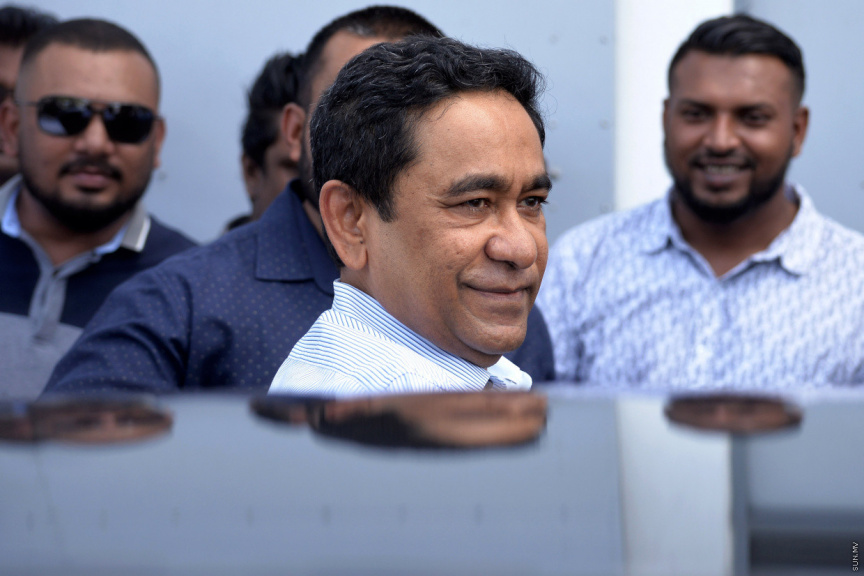
Former Maldivian President Abdulla Yameen Abdul Gayoom. (File Photo/Sun/Ahmed Aushan Ilyas)
At the appeal hearing at Supreme Court on Monday over the High Court’s decision to overturn an order to freeze multiple bank accounts owned by former Maldivian President Abdulla Yameen Abdul Gayoom, the state prosecution faced multiple questions over the legal basis for the request.
The Criminal Court issued the court order to freeze Yameen’s bank accounts in early 2019, citing that his accounts held public funds embezzled from MMPRC, and that failure to freeze the accounts will allow him to gain monetary gain from the funds.
However, the order was overturned upon appeal at the High Court, and the decision was subsequently appealed by the state at the Supreme Court.
At the appeal hearing at the Supreme Court this Monday, justices pressed the state with multiple questions over the legal basis for the request to freeze multiple accounts.
Justice Aisha Shujoon noted that the case involved one transaction, while the freeze order was requested for multiple bank accounts. She questioned the state for the reason for the request.
The public prosecutor said that details of the bank accounts show that Yameen’s Maldives Islamic Bank (MIB) account received a USD 1 million transfer, believed to be public funds. He said that the money was then transferred out to three other bank accounts.
“We needed to freeze all these funds or prevent transactions from these funds to investigate the origin of these funds, and to make a determination regarding the funds or to determine whether or not the state is entitled to the funds,” said the public prosecutor.
He said that Article 62 of Money Laundering Act establishes that the state may recover funds, along with additional funds linked with the laundered funds.
He said that it was based on this legal provision that the police requested for a freeze order on the multiple bank accounts.
Shujoon then questioned whether that reasoning was mentioned when the Criminal Court issued the freeze order, to which the public prosecutor said that investigators had been unaware of how the transactions had taken place when the request for the freeze order was made.
Justice Husnu Al Suood, too, pressed the state with questions over the same issue. Suood questioned whether one suspicious transaction was sufficient justification to freeze all assets.
He said that the STR (Suspicious Transaction Report) was on USD 1 million, and asked the legal basis on which the state requested a freeze on funds valued at more than the USD 1 million in question.
“Is there legal basis to request a freeze on all of a person’s assets, the entirety of his assets? Because the suspicion is based on one STR. This issue is about a USD1 million,” he said.
The public prosecutor provided the same response he provided to Shujoon, that Article 62 of Money Laundering Act allows for it.
Suood responded by repeating his question.
“What I am saying is, when you made the request, the issue was regarding a USD 1 million transaction, so, assuming the accounts held money funds than that, how, and on what legal basis, did you know to freeze all the funds when you made the request?” asked Suood.
The police investigative officer responded that the police noticed additional transactions.
“Look, that wasn’t mentioned on the court order you requested, or on submitted documents. What you are saying stems from your own belief” responded Suood.
Suood asked that the state clarify the exact amount of funds the state is entitled to recover and the legal basis for it before attending the next hearing.
The Supreme Court has yet to schedule the next hearing.